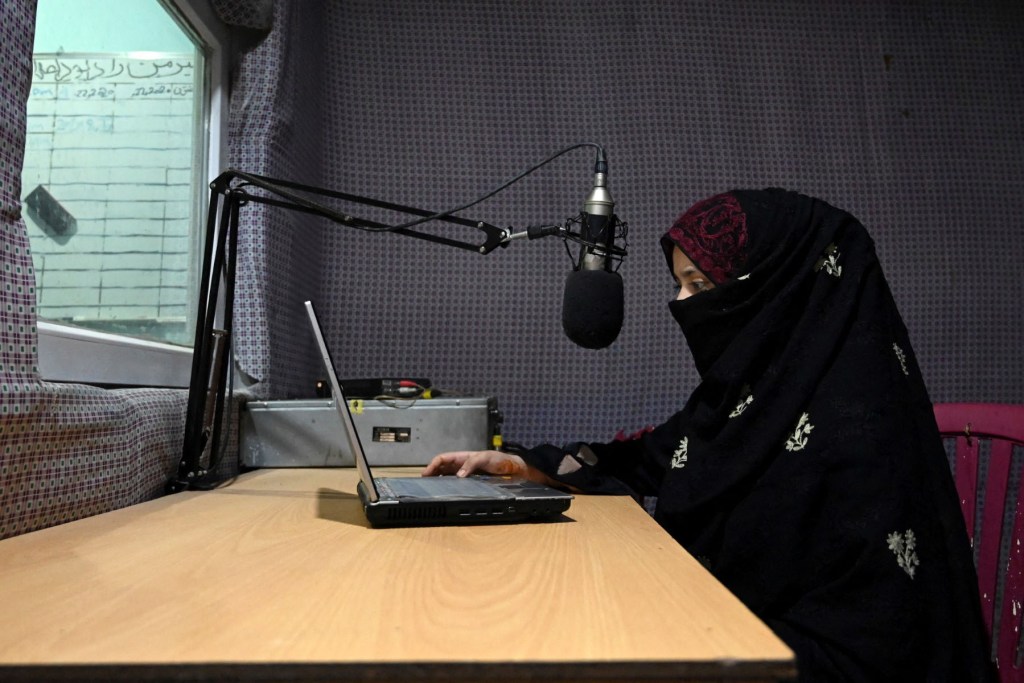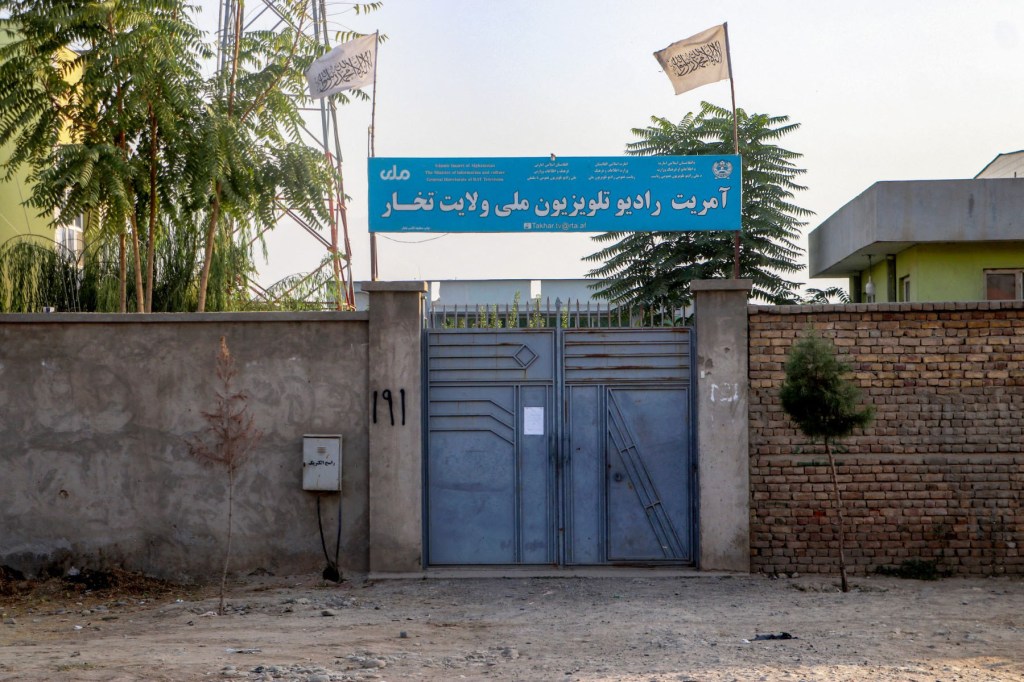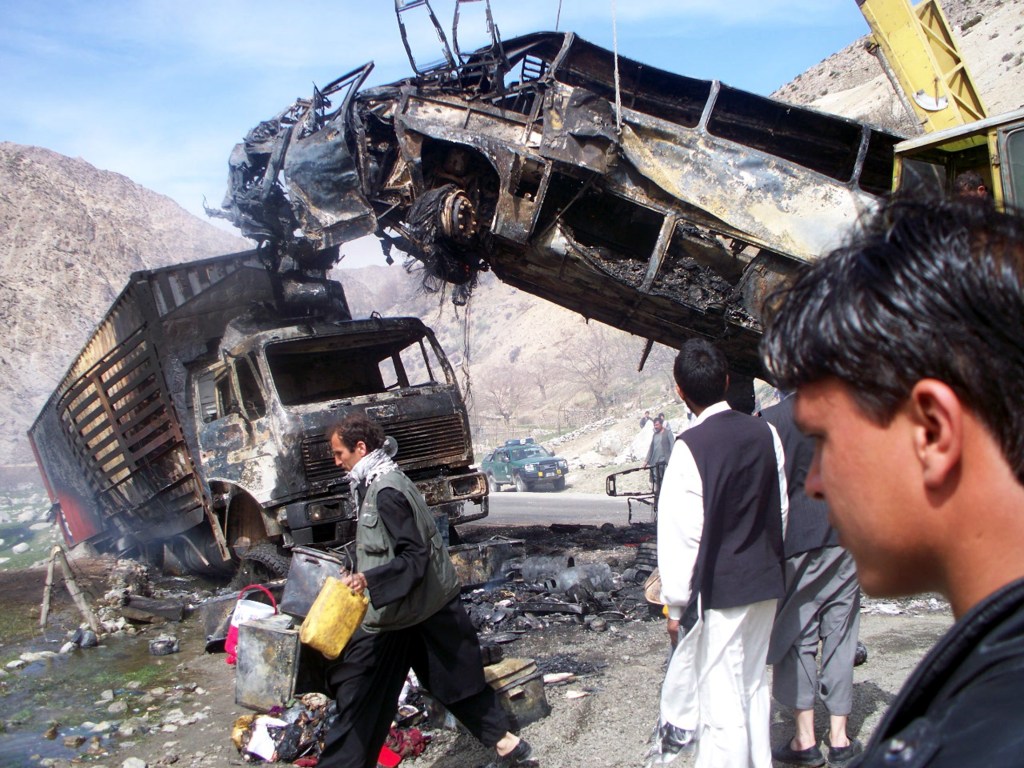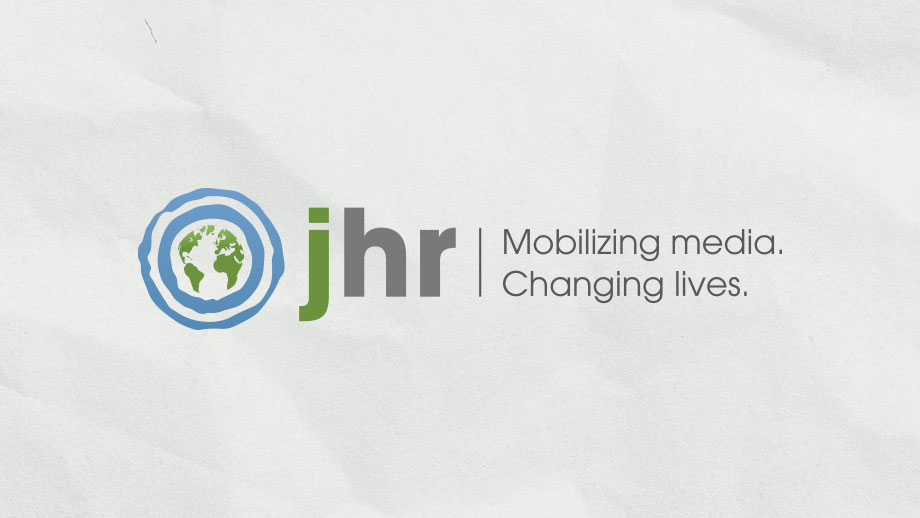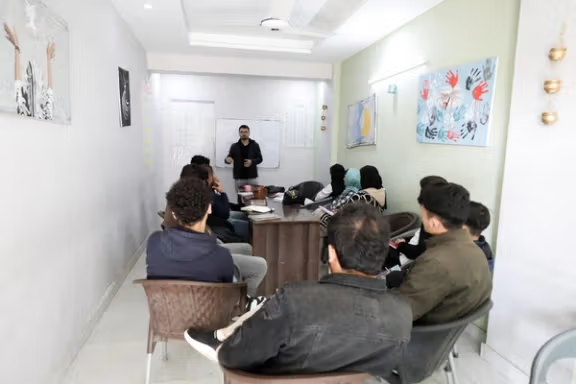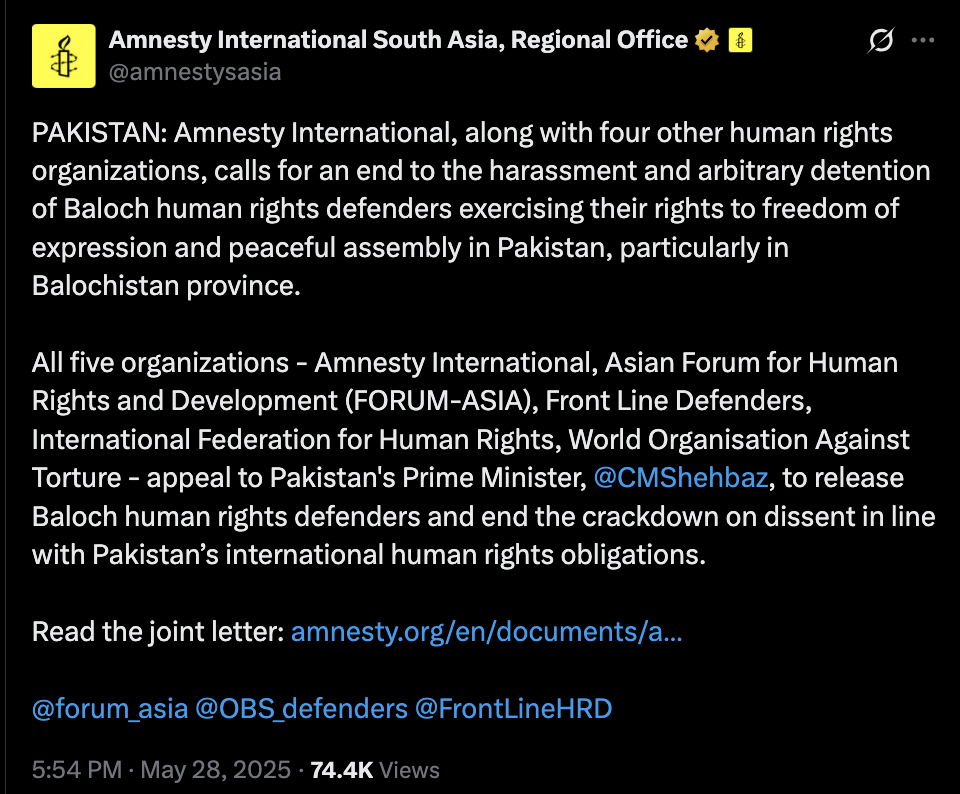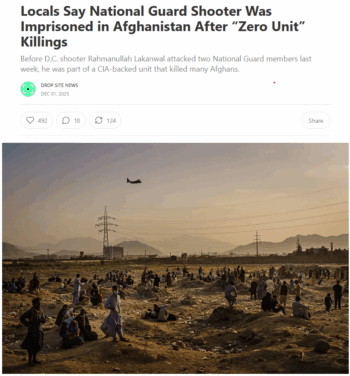
Drop Site (12/1/25): “The deadly assault last week near the White House was like a scene drawn from the world that the suspect, Rahmanullah Lakanwal, once inhabited in Afghanistan and which was shaped by the U.S.-led War on Terror during the last two decades.
Opinion writing about last month’s National Guard shooting in Washington, DC, serves as the latest example of US corporate media’s role in whitewashing US foreign policy.
The post-9/11 wars directly caused nearly a million deaths and dealt significant “blowback”—unintended repercussions experienced by the US as a result of its foreign policy—including rising extremist crimes by those with military backgrounds, according to a 2024 University of Maryland study.
On November 26, two members of the West Virginia National Guard—who were part of Trump’s National Guard deployment to DC—were shot without provocation, and one of the soldiers died from her injuries.
Law enforcement quickly named the shooting suspect as 29-year-old Rahmanullah Lakanwal, a former member of a CIA-backed Afghan force called “Zero Units.” These units reportedly killed civilians (ProPublica, 12/15/22, 1/5/23) and committed war crimes (Intercept, 12/18/20).
While Lakanwal is not accused of committing crimes abroad, and his motives for the alleged shooting remain unclear, he “suffered from mental health issues and was disturbed by the casualties his unit had caused,” a childhood friend told the New York Times (11/27/25).
Lakanwal was briefly imprisoned in Afghanistan, alongside other members of his Zero Unit team, after team members killed Afghan police members in a dispute over Taliban prisoners, Drop Site News (12/1/25) reported. Lakanwal had “long shown signs of significant psychological instability and drug use, even before he left Afghanistan,” Drop Site also detailed, citing multiple sources from the US and from his home province of Khost, Afghanistan.
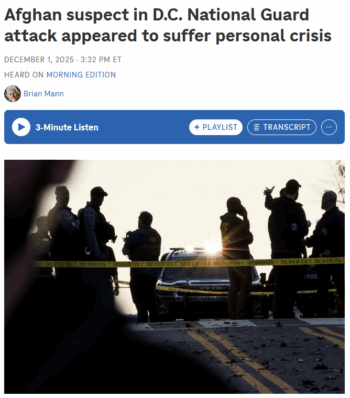
While NPR‘s headline (12/1/25) described the suspect as having a “personal crisis,” the story quotes a resettlement volunteer saying he believed Lakanwal was “suffering from both PTSD and from his work with the US military in Afghanistan.”
He was “left deeply troubled by the death of a close friend and fellow Afghan commander in 2024,” who unsuccessfully sought asylum in the US, CBS News (12/1/25) wrote, citing a former Afghan commando. In June, Lakanwal sought help from a CIA program meant to help Zero Unit veterans with immigration issues, but his last post wasn’t answered and was deleted by the chat’s administrator, according to Rolling Stone (12/1/25).
Although there were other, more individual factors that seemed to affect Lakanwal—an NPR headline (12/1/25) described him as undergoing a “personal crisis”—even the personal in such cases may be political. A refugee resettlement volunteer quoted by NPR wrote before the attack that Lakanwal was “suffering from both PTSD and from his work with the US military in Afghanistan.” When mental and emotional damage from combat experience is turned outward, that’s a classic example of blowback.
‘Realities of blowback’
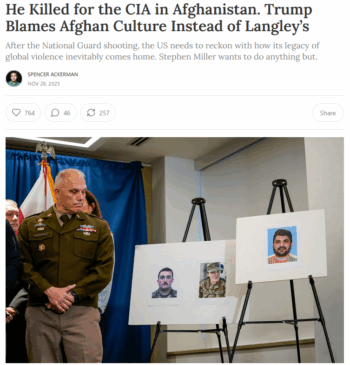
Spencer Ackerman (Zeteo, 11/28/25): “Much of the CIA’s Afghan workforce remains shrouded in official secrecy. But what is known about them is their wanton brutality, licensed and materially supported by the United States…. There is bound to be immense psychological damage when making someone, particularly a teenager, into a member of a death squad.”
Spencer Ackerman, national security journalist and author of the Forever Wars newsletter, penned an incisive editorial for independent news website Zeteo (11/28/25) on the blowback theory:
Lakanwal’s shooting spree is not the result of importing Afghan culture to America. While much will surely be revealed in Lakanwal’s upcoming trial, it looks more like the result of importing American culture to Afghanistan. The realities of blowback—the violence America experiences as the unintended consequences of the violence of US foreign policy—are what the US needs to examine in the wake of this horrifying murder if it expects to prevent the next one.
By contrast, six out of the eight US corporate media editorials and op-eds that covered the shooting ignored the extensive news reporting that suggests Lakanwal’s US military experience had a negative impact on his mental state, diverting attention to other aspects of the story, like the role of Trump’s National Guard deployment, Biden’s withdrawal from Afghanistan, or Lakanwal’s immigration status.
These opinions did little to challenge the stance of DHS Secretary Kristi Noem, who has claimed (Newsweek, 11/30/25) that Lakanwal was likely “radicalized” after entering the US, and blamed—somewhat inconsistently—his entry on Biden’s vetting process. (If Lakanwal only developed radical views after he came to the US, how would vetting have caught them?)
One op-ed didn’t mention Lakanwal’s military experience at all (New York Post, 11/28/25). Three of the pieces briefly referenced his CIA ties—either treating them as a positive thing (“he had cooperated with the CIA in his home country and had been vetted by the American intelligence community”—Washington Post, 11/27/25; “the CIA said the man had been part of a CIA-backed Afghan ‘partner force’ in Kandahar province, one of the most dangerous places during the war”—Wall Street Journal, 11/28/25) or more neutrally (New York Post, 11/29/25). Another noted that he “served alongside US troops in Afghanistan” (New York Post, 11/27/25). But none of those made the connection between Lakanwal’s military background and his reported mental health struggles.
The New York Times editorial board (11/27/25), for its part, wrote that “he was described by a friend as a young man troubled by mental illness, as is so often the case in similar crimes,” and added in the same paragraph that “he reportedly had worked alongside the American intelligence services in his country,” without connecting the two—despite its paper’s own reporting (11/27/25) confirming Lakanwal’s mental health struggles related to his military experience.
Diverting attention
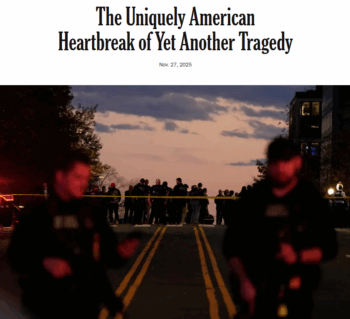
The New York Times editorial board (11/27/25) repeated the handwashing cliché: “No one, including the president, is responsible for this tragedy, except for its perpetrator.”
The New York Times and Washington Post tried to relieve Trump of any blame for the shooting. The Times (11/27/25) opined that “no one, including the president, is responsible for this tragedy, except for its perpetrator”:
It should be possible to understand both that Mr. Trump’s use of the National Guard has been outrageous and that the use did not cause this shooting.
The Washington Post editorial board (11/27/25)—which has grown more right-wing since Trump’s inauguration—took it a step further when it wrote that “blaming the [National Guard’s] presence for provoking this monstrous act is inappropriate.”
The Wall Street Journal editorial board (11/28/25), meanwhile, attributed blame to Biden’s 2021 withdrawal from Afghanistan:
When and how the shooter was approved for entry will become clearer, and no doubt an orderly withdrawal would have allowed more careful investigation. This is one more cost of the Biden administration’s Afghan failure.
The negative framing of Biden’s Afghanistan withdrawal is hardly a surprise for the Journal’s editorial board, which has a history of hammering that point home (e.g., 8/15/21, 8/19/21, 4/26/23, 9/9/24). But there is no evidence that an “orderly withdrawal” from Afghanistan would have allowed a “more careful investigation” of Lakanwal’s background.
After all, Lakanwal was vetted before he worked with the CIA in Afghanistan, and he—like all of the tens of thousands of Afghans resettled in the US through the Biden-era Operation Allies Welcome program—“underwent thorough vetting by counterterrorism authorities before entering the United States,” involving the Department of Homeland Security, FBI, CIA and the National Counterterrorism Center, the Washington Post (11/28/25) reported.
That reporting contradicts the paper’s own editorial board (11/27/25), which claimed a day earlier that “it’s been obvious for years that vetting was insufficiently thorough.” “The Biden team’s failure to prepare for the fall of Kabul inevitably brought some dangerous people into the country,” the editorial said, who “should be identified and repatriated.”

Professional Islamophobe Douglas Murray (New York Post, 11/27/25) argued that the DC shooting showed Trump was right to call for a “total and complete shutdown of Muslims entering the United States.”
While the Washington Post, Wall Street Journal and New York Times acknowledged that not every Afghan refugee should be punished for the shooting, the right-wing New York Post editorial board (11/29/25) argued that the incident necessitated a “top-to-bottom overhaul of immigration law.”
The New York Post published two more guest essays that expanded upon that argument. Far-right British-American journalist Douglas Murray argued in the Post (11/27/25) that “you cannot just leave borders open, or allow in large numbers of people with totally different value systems from your own.”
Mediaite editor Isaac Schorr (New York Post, 11/28/25) added that implementing “a rigorous, multi-layered ideological testing process to determine their suitability for life in America” should include a “one-half-strike-and-you’re-out process to prove they want to be ‘American’ in the truest sense of the word.”
‘Assimilation-focused immigration’
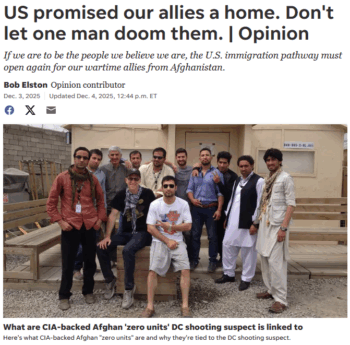
Bob Elston (USA Today, 12/4/25): “Many Afghans fought side by side with US servicemembers. Some were given a pathway to this country, and the vast majority of them now reside here peacefully.”
USA Today was the lone US corporate media outlet to acknowledge in its opinion section that Lakanwal’s military experience had a negative impact on his mental state. Bob Elston, a grant writer for a refugee resettlement agency and former US State Department analyst, noted in a guest essay (12/4/25) that Lakanwal’s
commando unit in Afghanistan routinely went on missions targeting some of the most dangerous members of the Taliban, the Islamic State terrorist network and Al Qaeda.
It is not difficult to imagine he came away from those experiences with post-traumatic stress disorder, like so many US servicemembers involved in the war.
Elston argued that the US must reopen its immigration refugee pathway program, which Trump froze and defunded upon his inauguration.
Two days later, right-wing USA Today columnist Dace Potas (12/6/25) acknowledged that Lakanwal “had helped CIA operations” and “had difficulties assimilating due to post-traumatic stress disorder.” Yet he still argued that US immigration policy needs to be reworked to “assimilation-focused immigration and a merit-based criteria.”
Blaming one tragic act on a community of 200,000 people, as the New York Post (and Trump) repeatedly did, is blatantly absurd and racist. Legal immigrants are 74% less likely to be incarcerated than native-born Americans, while illegal immigrants are half as likely, according to the libertarian think tank Cato Institute analysis of data from 2010 through 2023.
Although the New York Times, Washington Post and Wall Street Journal mostly challenged this racist argument, their other opinions remained limited to the political blame game between the Trump and Biden administrations, and in doing so, ignored one of the most important issues that needed to be publicly discussed: the consequences of US foreign intervention.
This post was originally published on FAIR.



